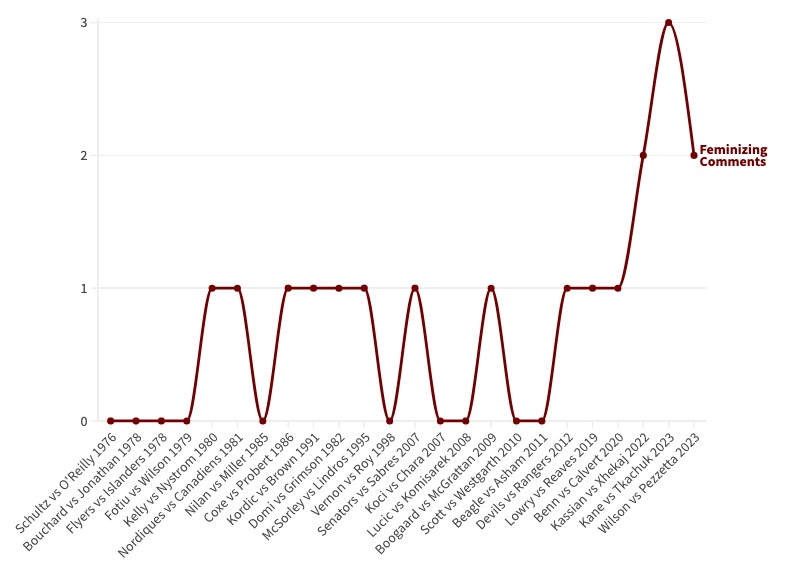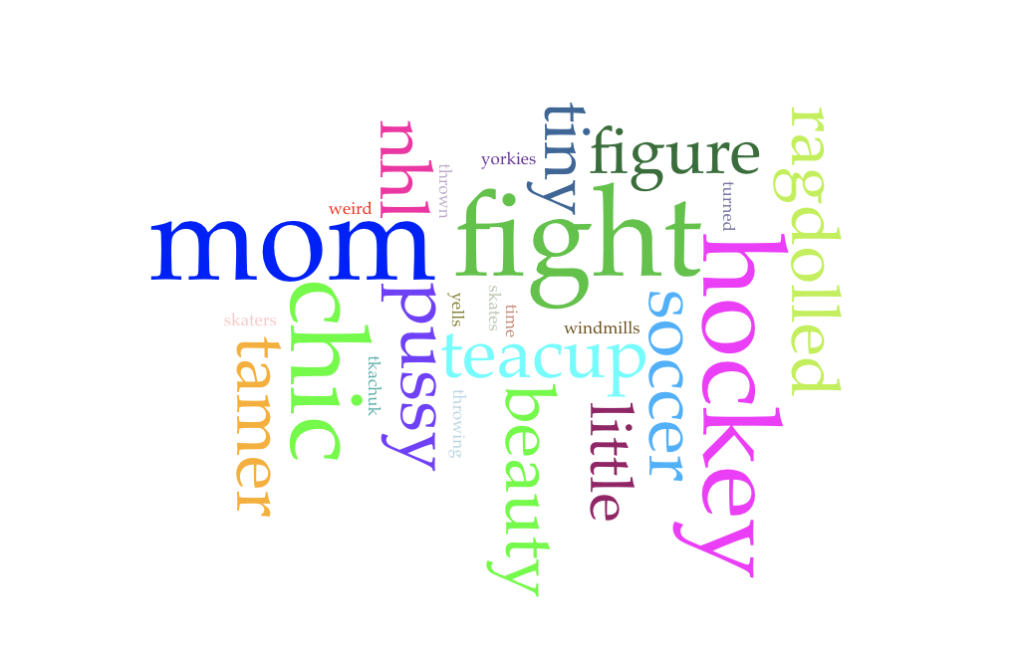Not only did the lack of discourse surrounding toughness decrease, but new themes became prevalent: the use of feminizing epithets to insult this apparent lack of toughness. Feminizing discourse often appears when commenters insult the fighters. Though this theme is less present than toughness, it was still noticeable; 5% of the comments included some sort of feminizing discourse and nearly all of these comments were made in an insulting manner. Additionally, feminizing discourse notably increased within recent fights; reflective of the decline of perceived toughness. The 20’s was the only decade in which feminizing discourse appeared in all four of the videos, a decade that is not even half over with. Within this half decade, 45% of the comments have some type of negative feminizing discourse. Here we can see a visualization of this increase over time:

This sort of feminizing discourse appeared in many different forms, with some comments even directly referring to players as women. In a fight between Evander Kane and Brady Tkachuk in 2023, one comment reads, “The fights in the NHL now resemble two girls fighting in the 80’s in highschool… everyone yells, chic fight chic fight”(“Evander Kane vs Brady Tkachuk Feb 11, 2023” 2023). The comment is not only referencing this fight, but rather every fight in the NHL today by claiming that all players participating in fights today fight like girls. Ultimately, this comment is meant as an insult to the players fighting, similar to the cliché phrase “you fight like a girl”. This narrative not only attempts to label men as weak by implying that women are weak.
Using Voyant, the most common phrases within comments with feminizing discourse were identified:

In other examples, women are further isolated within the hockey world. This is seen in a comment from the Devils vs Rangers line brawl, “They try to erase the physical emotion from the game to satisfy soccer moms and sponsors”(“Devils vs Rangers start of game line brawl Mar 19, 2012.” 2012). Within this quote, the commenter notes their displeasure with the lack of violence in the NHL by blaming “soccer moms”. Citing women as the reason fights as large as the 2012 Devils vs Rangers brawl no longer occur in today’s game. Attempting to villainize women for fans who miss the older, more violent game.
Similarly to feminizing discourse, there are two examples from the sample that use sexuality, specifically homosexuality, as a means to insult players. In another fight from 2022 between Zack Kassian and Arber Xhekaj this can be seen: “Didnt let kassian do the gay little pre fight routine they all do”(“Zack Kassian vs Arber Xhekaj Oct 20, 2022” 2022). Instead of using gender as an insult here we see sexuality used to insult the players. The commenter called the staging and theatrics that often occur before a fight a homophobic slur, while expressing their satisfaction about it not occurring. Just as commenters have attempted to frame alternative genders as weak, they also attempt to frame alternative sexualities as weak. Below this comment and others are given context within the fight itself:
Zack Kassian vs Arber Xhekaj Oct 20, 2022, Hockeyfights.com, 2022
Throughout the data when references to femininity or homosexuality were made, they were almost always made in a derogatory manner. In a sport as masculine and historically “tough” as hockey, this is problematic. This sexism and homophobia not only hurts the reputation of players and fans within the sport, but also the inclusivity of the game. Women and sexual minorities are not going to feel welcome in a sport where sexism and homophobia are present.